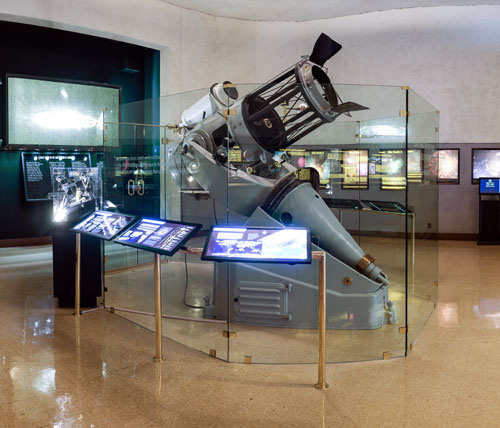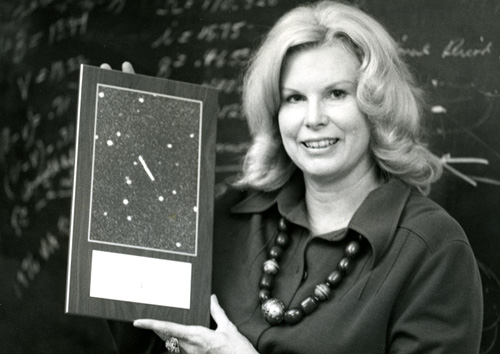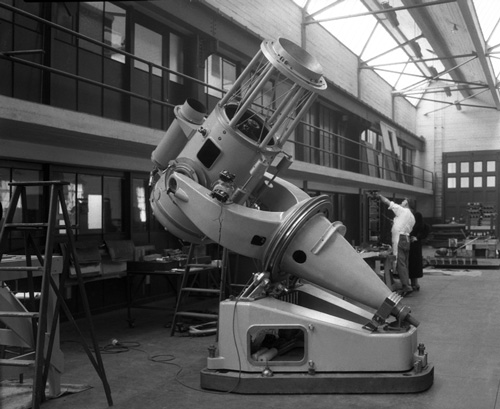The Helin Commemorative Exhibit:
Searching the Sky for Dangerous Neighbors
Eleanor Helin and the 18-inch Telescope
Dr. Eleanor Francis "Glo" Helin (1932 – 2009) was a leader in the detection and study of Near-Earth Objects (NEOs), and a prolific astronomical observer at Palomar Observatory. Thanks to a generous gift from the trust of Dr. Helin and her husband Ronald, Palomar Observatory is happy to announce the opening of Searching the Sky for Dangerous Neighbors at the Palomar Observatory Visitor Center.
|
The Helin Commemorative Exhibit includes a display of the Palomar 18-inch telescope and topical panels, videos, and artifacts that describe the important work of identifying potentially hazardous NEOs and Dr. Helin's significant contributions to that work. Eleanor Helin BiographyEleanor F. Helin was a planetary scientist at the California Institute of Technology (Caltech) and the Jet Propulsion Laboratory (JPL). She was a pioneer in the search and survey of near-Earth asteroids (NEAs)—asteroids that occasionally come close to Earth and can become a potential impact hazard. Helin began her hunt for asteroids in 1972 at Palomar Observatory using the 18-inch (0.46-m) Schmidt telescope. She had joined Caltech in 1960 as a geologist interested in meteorites and the impact origin of lunar craters. Over time, her interest shifted to studying potential impactors in Earth's vicinity. Her work with the Palomar Planet-Crossing Asteroid Survey (PCAS) photographic program yielded its first near-Earth asteroid on July 3, 1973. By the end of the program in 1995, PCAS had discovered 65 NEAs, about a fifth of all NEAs known until then. As the technology became available, Helin pressed for automating the search for NEAs. This was accomplished with the Near-Earth Asteroid Tracking (NEAT) project. NEAT began operations in 1996 at Haleakalā Observatory in Maui, Hawaiʻi, and at Palomar in 2001 with the Samuel Oschin Telescope. In eleven years of observations, NEAT found over 36,000 new Solar System bodies of which 442 are near-Earth asteroids. Helin was awarded many honors, including NASA's Exceptional Service Medal and the naming of the minor planet (3267) Glo. The USS Helin (NCC-1692), a starship in the Star Trek franchise, was named after her for “having discovered an unprecedented number of asteroids and comets.” |

The Helin Commemorative Exhibit at the Greenway Visitor Center (P. Gardner/Caltech Optical Observatories) 
Dr. Helin holding the discovery image for asteroid Ra-Shalom, circa 1979 (Helin Family Estate) |
Indeed, the Minor Planet Center lists Helin among the top discoverers with over 500 asteroids and a dozen comets discovered or co-discovered. The recognition she appreciated most was an honorary doctorate in 1992 from her alma mater, Occidental College in Los Angeles.
Palomar 18-inch Schmidt Telescope
|
The 18-inch (0.46-m) Schmidt telescope was the first instrument at Palomar Observatory. It saw first light on September 5, 1936 and was Palomar's only operational telescope until 1949. Beginning in the late 1940s, this instrument was used in conjunction with the newly-built 48-inch (1.2-m) Schmidt (later to become the Samuel Oschin Telescope) to provide targets for the 200-inch (5.1-m) Hale Telescope. Later, between the 1970s and 90s, the 18-inch proved to be a workhorse in the systematic search for minor bodies in the Solar System. In its long and productive life, this instrument has yielded many discoveries, including a large number of asteroids and nearly 50 comets. The Schmidt telescope is actually a camera with photographic film or plates placed at the focal plane inside the tube. The diameters of the mirror and correcting plate are 24 inches (61 cm) and 18 inches (46 cm), respectively. The focal length is 36 inches (92 cm), producing a focal ratio of f/2. The film, held by holders that apply the appropriate spherical curvature, was cut in circles 6.25 inches (15.5 cm) wide and covered an area of the sky 8.75 degrees in diameter. |

The 18-inch Schmidt as photographed by F. Ellerman during its fabrication in the Caltech Instrument Shop, 1936 (Palomar Observatory/California Institute of Technology/Caltech Archives) |
Display Materials
Please send your feedback to palomar-info at astro.caltech.edu
Helin Commemorative Exhibit / v 0.4
Last updated: 8 April 2014 ACM/AFB






